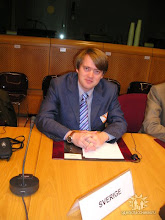Raphael Lemkin was born on 24 June 1900 in a village in what is now Belarus.[1] Not much is known of his early years; whilst it was alleged that he was born into a farmer's family, apparently, his relatives were prosperous enough to make possible his prestigious law education in Poland and then in Germany and, afterwards, his doctorate in philology from the University of Lwow. His first professional appointment was that of Secretary for the Court of Appeals in Warsaw, where he later became a public prosecutor. Criminal law must have been Dr. Lemkin's passion from the early years in the profession. From 1929 to 1935, he served as secretary of the Committee for Codification of the Laws of the Polish Republic. It was during that period that he took part in the Fifth International Conference for the Unification of Criminal Law, held in Madrid in 1933, as a member of the Polish delegation, where he made an enterprising proposal to criminalise "acts of barbarism and vandalism". The formula must have been worded in such a direct way as a reaction to the atrocities of the Spanish Civil War, for terming which the author apparently did not consider proper to look for euphemisms. However, Dr. Lemkin's initiative on such a sensitive legal issue brought him into disfavour with the Polish government, which, at the time, was seeking appeasement with Nazi Germany. He was compelled to resign from the Committee in 1935 and returned to private law practice.
Until the outbreak of the Second World War, Dr. Lemkin worked as a successful academic in the domain of private (national and international) law. In 1938, he published in Krakow (as an editor) a 725-page-strong book entitled Prawo karne skarbowe. The volume dealt, in a thorough way, with Polish national revenue laws and tax evasion issues in that country. Another sizeable volume on private law, La règlementation des paiements internationaux, was published in 1939 in France; the 422-page book analysed the key trends in the complex financial world of the 1930s. However, even during this period, he could not seemingly put his primary professional interest – criminal law – out of his mind. In 1939, he published simultaneously in the United States and the United Kingdom an English translation of Poland's Criminal Code of 1932 and of the Law on Minor Offences. This publication was done in partnership with Professor Malcolm McDermott, a member of the North Carolina Bar and a faculty member at the Duke University Law School, who would quite soon have a supportive role to play in Dr. Lemkin's early years in the United States.
Soon after his arrival in the United States in 1941, Dr. Lemkin delivered a lecture on the legal framework of Nazi Germany's control over foreign economies at the American Bar Association's annual session. This lecture was largely based upon his ongoing research whose conclusions Columbia University Press released in November 1944, and which has ever since been considered among the finest examples of the 20th-century legal and political thought.[2] Soon thereafter Professor Malcolm McDermott recommended Dr. Lemkin for a teaching appointment at Duke, which job he soon had to combine with a post at the United States Board of Economic Warfare and later – also at the War Department, as a foreign affairs advisor.
It was in Axis Rule that Dr. Lemkin used the term "genocide" for the first time. He produced the notion after having heard Prime Minister Winston Churchill refer to Nazi atrocities as "a crime without a name".[3] The new definition took in a state sponsored, coordinated plan aimed at the physical annihilation of a national group or groups. More specifically, such destruction could manifest itself in the disintegration of the political, social, economic, religious, and cultural institutions – the very foundations of the concept of nationality. Raphael Lemkin's book became a helpful source of information, methodology and evidence at the Nuremberg trial, where its author acted an adviser to Justice Robert Jackson. In response to opponents of the International Military Tribunal who argued that it was applying ex post facto laws, Dr. Lemkin argued:
The principle of ex post facto in criminal law tends to protect the individual's liberty. A person should not be oppressed by the state when he commits an act which seems to him fair and decent and which becomes a crime only through subsequent legislation… Murders and atrocities as such were prohibited also in Germany. Hitler simply exempted his henchmen and himself of responsibility for such crimes. Is the restoration of such responsibility for crime an ex post facto law? Is it a destruction of the guaranties of individual liberty? Do we not adhere to the principle that no liberty can justify crime, oppression, and cruelty?[4]
[1] In contrast to some sources, the correct date of 24 June 1900 appeared in an entry in Who Was Who in America, [Vol. 3, Chicago: Marquis, 1960, p. 511] and on the gravestone erected by Lemkin's family a year after his burial at Mt. Hebron Cemetery in Queens, New York. There is no confusion, however, about Raphael Lemkin's birth place. All sources refer to Bezwodne as a village near to Wolkowysk (now Volkovisk), a small city in today's Belarus. At the time of Lemkin's birth, Wolkowysk was part of Tsarist Russia. Between the World Wars, it was located in Poland. Between 1945 and 1991, it was part of the Belorussian Soviet Socialist Republic.
[2] R. Lemkin, Axis Rule in Occupied Europe: Laws of Occupation, Analysis of Government, Proposals for Redress (Columbia University Press, 1944)
[3] In a speech broadcast in August 1941, Winston Churchill said: "We are in the presence of a crime without a name".
[4] R. Lemkin, "The Legal Case Against Hitler," The Nation, 24 February 1945, at 205
Subscribe to:
Post Comments (Atom)

No comments:
Post a Comment